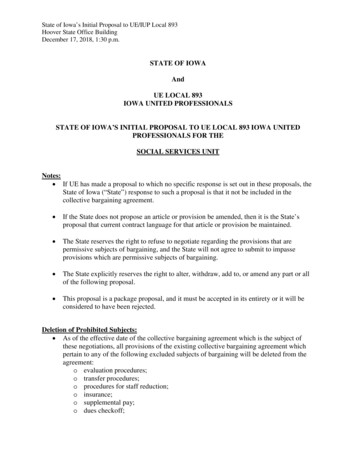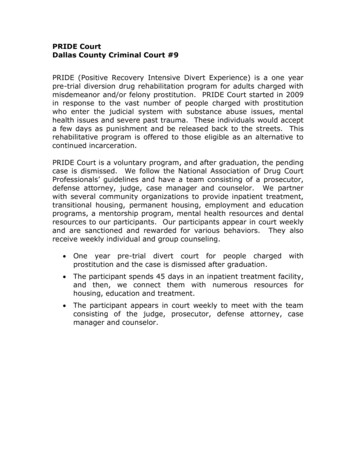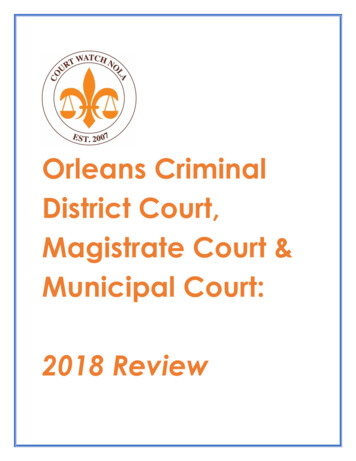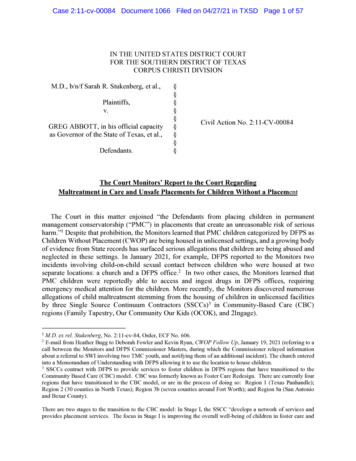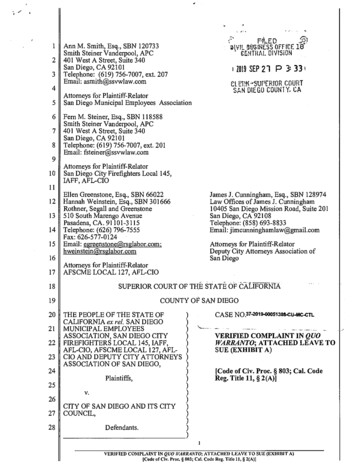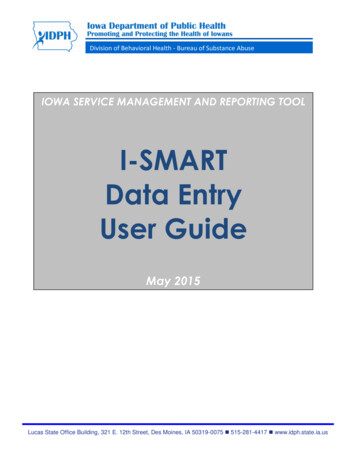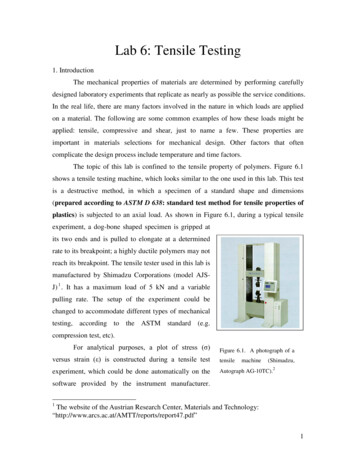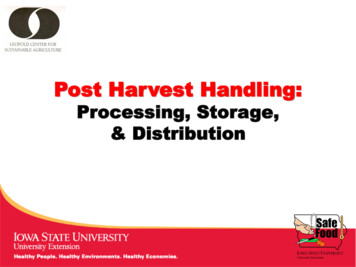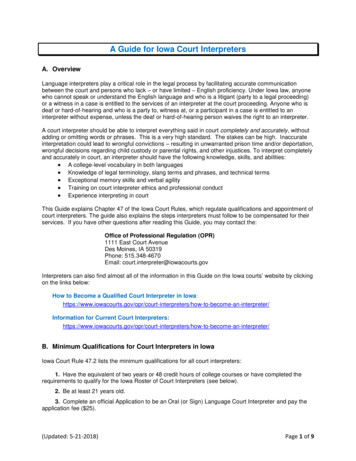
Transcription
A Guide for Iowa Court InterpretersA. OverviewLanguage interpreters play a critical role in the legal process by facilitating accurate communicationbetween the court and persons who lack – or have limited – English proficiency. Under Iowa law, anyonewho cannot speak or understand the English language and who is a litigant (party to a legal proceeding)or a witness in a case is entitled to the services of an interpreter at the court proceeding. Anyone who isdeaf or hard-of-hearing and who is a party to, witness at, or a participant in a case is entitled to aninterpreter without expense, unless the deaf or hard-of-hearing person waives the right to an interpreter.A court interpreter should be able to interpret everything said in court completely and accurately, withoutadding or omitting words or phrases. This is a very high standard. The stakes can be high. Inaccurateinterpretation could lead to wrongful convictions – resulting in unwarranted prison time and/or deportation,wrongful decisions regarding child custody or parental rights, and other injustices. To interpret completelyand accurately in court, an interpreter should have the following knowledge, skills, and abilities: A college-level vocabulary in both languages Knowledge of legal terminology, slang terms and phrases, and technical terms Exceptional memory skills and verbal agility Training on court interpreter ethics and professional conduct Experience interpreting in courtThis Guide explains Chapter 47 of the Iowa Court Rules, which regulate qualifications and appointment ofcourt interpreters. The guide also explains the steps interpreters must follow to be compensated for theirservices. If you have other questions after reading this Guide, you may contact the:Office of Professional Regulation (OPR)1111 East Court AvenueDes Moines, IA 50319Phone: 515.348-4670Email: court.interpreter@iowacourts.govInterpreters can also find almost all of the information in this Guide on the Iowa courts’ website by clickingon the links below:How to Become a Qualified Court Interpreter in ters/how-to-become-an-interpreter/Information for Current Court interpreters/how-to-become-an-interpreter/B. Minimum Qualifications for Court Interpreters in IowaIowa Court Rule 47.2 lists the minimum qualifications for all court interpreters:1. Have the equivalent of two years or 48 credit hours of college courses or have completed therequirements to qualify for the Iowa Roster of Court Interpreters (see below).2. Be at least 21 years old.3. Complete an official Application to be an Oral (or Sign) Language Court Interpreter and pay theapplication fee ( 25).(Updated: 5-21-2018)Page 1 of 9
4. Sign an oath to abide by the Code of Professional Conduct for Judicial Branch Interpreters(Chapter 48 of the Iowa Court Rules).5. Pass a criminal history check. Interpreters must complete a "release/waiver" form to authorizethe Office of Professional Regulation staff to conduct the criminal history search. NOTE: Personsconvicted of a felony, or convicted of any less serious crime that involves dishonesty or moral turpitude,are prohibited from interpreting in Iowa's courts unless the Office of Professional Regulation (OPR)determines otherwise.Note: Forms for the Application, Release/Waiver, and Registration are available rs/how-to-become-an-interpreter/C. Iowa’s Roster of Court InterpretersUnder Chapter 47 of the Iowa Court Rules, an interpreter who is on the statewide Roster of CourtInterpreters – and who is reasonably available – will be appointed before a non-roster interpreter.Requirements for being on the Roster of Court InterpretersIn addition to meeting the basic qualifications for court interpreters listed in section B. (above), aninterpreter must complete the following requirements to be listed on the Roster:1. Attend a two-day court interpreter orientation programInterpreters must attend a two-day orientation program before they can take the written tests forcourt interpreters (see below). The Iowa Interpreters and Translators Association (IITA) coordinates theorientation program. For further information, go to the IITA website orkshop/The registration fee is 155.2. Pass two written exams for court interpreters (Registration fee 50 for Iowa residents)a. Written exam 1 is the standard written exam for court interpreters developed by the NCSC’sLanguage Access Services Section (hereafter NCSC). With a total of 135 multiple-choicequestions (in English), it tests an interpreter’s knowledge of:(1) General English vocabulary (50 questions) and slang (25 questions);(2) Legal terms (36 questions), court-related issues (14 questions), and ethics (10questions).To pass this exam, interpreters must correctly answer 80% of the 135 questions.b. Written exam 2 is a multiple-choice exam (25 questions in English) on Iowa’s Code ofProfessional Conduct for Court Interpreters and Translators (Chapter 48 of the Iowa CourtRules). To pass this exam, interpreters must correctly answer 75% of the questions.In addition to the requirements in C.1 and C.2 above, oral language interpreters must:Pass the ALTA Speaking and Listening Test (Registration fee 65 for Iowa residents)ALTA is a nationally recognized language services and testing company. Interpreters seekingplacement on the official roster must pass ALTA’s Speaking and Listening Test with a score of at least 11on a scale of 12. The ALTA tests are given at the Office of Professional Regulation and in each of the(Updated: 5-21-2018)Page 2 of 9
judicial districts. The test is a language fluency test conducted by telephone in the interpreter’s nonEnglish language.In addition to the requirements in C.1 and C.2 above, sign language interpreters must:(1) Meet the minimum requirements to be a court interpreter (in Rule 47.2),(2) Be licensed by the Iowa Board of Sign Language Interpreters and Translators pursuant toIowa Code chapter 154E (except as allowed under Iowa Code section 154E.4), and(3) Meet the criteria to be at least a class B sign language interpreter under Iowa Court Rule47.5(2).Schedule for the written examsThe written exams are conducted on at least two dates each year. The schedule is available rs/how-to-become-an-interpreter/Registration forms for the court interpreter examsRegistration forms are also available at the link above.Waiver of Roster requirementsThe OPR may waive the NCSC's multiple choice exam or Iowa's ethics exam for interpreters who havepassed the same exam within the last five years in another state that administers the NCSC’s courtinterpreter exams. The OPR may also waive the requirement of the court interpreter orientation program ifthe interpreter has taken a comparable program within the last three years in another state.D. Court Interpreter Certification in IowaPursuant to Chapter 47 of the Iowa Court Rules, Iowa’s courts will appoint a certified court interpreter, ifone is reasonably available, before they will appoint a noncertified interpreter. Certified court interpretersalso receive a higher hourly fee than noncertified interpreters. To become a certified court interpreter inIowa, an interpreter must meet the requirements to be on the Roster of Court Interpreters (see above) –AND – complete the following additional steps:1. Certification for sign language interpretersTo be classified as a certified court interpreter for sign language, interpreters must hold apermanent license from the Iowa Board of Sign Language Interpreters and Transliterators and obtain aSpecialist Certificate: Legal (SC:L) or a conditional legal interpreting permit—relay (CLIP-R) from theNational Testing System of the Registry of Interpreters for the Deaf (NTSRID). For more information onthe requirements for sign language interpreters in Iowa, see the Iowa Department of Human Rightswebsite ign-Language-Interpreters-and-Transliterators2. Certification exams for oral language interpreters (Registration fee 250 for Iowa residents)To achieve certification in Iowa, an oral language court interpreter must pass the certificationexams offered by one of the following organizations: The Federal Court Interpreter Certification Program– See: http://www.ncsc.org/fcice/ The National Association of Judiciary Interpreters and Translators(Updated: 5-21-2018)Page 3 of 9
– See: https://najit.org/ The National Center for State Courts (NCSC) Language Access Services Section– See: terpreter-Certification.aspxIowa’s Office of Professional Regulation (OPR) offers the NCSC’s certification exams at leasttwice each year. For a list of languages for which certification exams are currently offered byNCSC, go to: ources.aspx3. Contents of the certification exam for oral language interpretersThe certification exam includes three components to assess an interpreter’s ability to completelyand accurately interpret in three different modes used in court and other legal proceedings: Oralinterpretation of written two documents (one in English and one in the other language) Consecutiveinterpretation (primarily done during witness testimony) Simultaneousinterpretation (continuous interpreting; e.g., during an attorney’s closingargument)In Iowa, a trained OPR staff member administers the oral interpretation certification exam. The examrequires an interpreter (examinee) to interpret digitally recorded court testimony, other recorded in-courtstatements, and two one-page documents from English to their other language – and vice-verse – asneeded. The interpreter’s spoken interpretation is continuously recorded by the examiner using a highquality digital recording system. The digital audio recording of the interpreter’s exam is sent to a certifiedcourt interpreter who has been trained by the NCSC as a certification exam rater.Overall, the national pass rate for the NCSC’s certification exams is about 10 to 20 percent, sointerpreters must be well-prepared to take these exams.4. Requirements for taking the NCSC’s oral interpretation certification exams in IowaTo qualify to take the NCSC’s certification exams in Iowa, interpreters must fulfill all therequirements to be on the Roster of Court Interpreters (above).5. Requirements for passing the NCSC’s certification (oral) exam in IowaTo become certified in Iowa, interpreters must score at least 70 percent correct on each of thethree parts of the certification exam in a single test session. This is a high standard among the NCSCstates. For more information on the certification exams, go to:6. Reciprocity of certifications awarded by states that use or recognize the NCSC examsMost state court systems offer and administer the NCSC’s certification exams. States that do notadminister the NCSC’s exams typically recognize an interpreter as “certified” if the interpreter took theNCSC’s exam in another state and passed the exam by meeting the NCSC’s high standards for passingit. Iowa maintains a high standard for certification (i.e., an interpreter must all three parts of the exam in asingle test session), so an interpreter who becomes certified in Iowa will be recognized as certified inalmost all other states. However, many states allow interpreters to pass all three parts of the exam overmultiple test sessions, by allowing interpreters to re-take just the parts of the exam that they failed inprevious test session(s). If an interpreter passes the NCSC’s certification exam in another state bypassing the three parts of the exam in multiple test sessions, the interpreter will be considered a Class Binterpreter in Iowa.7. Schedule for oral language certification exams in Iowa(Updated: 5-21-2018)Page 4 of 9
The Office of Professional Regulation will offer the NCSC’s certification exams each year, usuallyin May and September. For more information go rs/how-to-become-an-interpreter/8. Preparing for the oral language certification examsFor information on preparing for the oral certification exams, go pxE. Policies on Re-taking the Exams for Court Interpreters1. Written examsThere are two written exams for court interpreters: (1) the standard NCSC exam, with 135multiple-choice questions; and (2) a multiple-choice exam on the Code of Professional Conduct for CourtInterpreters and Translators, with 25 questions. Interpreters who pass only one of the two written examsmust re-take just the exam(s) they did not pass in the first test session. According to the NCSC’sguidelines, an interpreter can take the same version of a written exam only one time in a 12-month periodand should never be allowed to take the same version more than twice. There are only two versions ofthe NCSC’s multiple-choice test (135 multi-choice questions).2. Oral interpretation certification examsThe NCSC enforces the standard that no applicant can take the same version of an exam withinsix months. OPR regularly rotates the versions of the exams for which there are multiple versions.F. Priorities in the Appointment of Court InterpretersPursuant to Iowa Court Rule 47.3(4), when a court needs a language interpreter, the court will appoint thehighest-ranking interpreter who is reasonably available; and within each classification the courts will givepreference to interpreters who are on the statewide Roster. Court interpreters are ranked in the followingorder of preference: ClassA – Certified oral & sign language court interpreters: meet Iowa’s standards for certification ClassB – Noncertified oral & sign language court interpreters: exceed basic Roster requirements*C – Noncertified oral language court interpreters on the Roster: have met basic Rosterrequirements. NOTE: There are no Class C sign language interpreters. Class Unclassified– Noncertified oral language court interpreters not on the Roster:*Class B noncertified oral language interpreters include those who have met Roster requirements and at leastone of the following requirements: Took a court interpreter certification exam and failed to achieve scores in a single test session that meetIowa’s standards for certification, but obtained an average of at least 65 percent on the three parts of theexam. Became certified in a state that uses the NCSC certification exams, but the interpreter’s scores did not meetIowa’s standards for passing. Completed a college-level court interpreter training program approved by the state court administrator (e.g.,at the Des Moines Area Community College) and obtained a 3.0 GPA or higher.(Updated: 5-21-2018)Page 5 of 9
G. Process for Appointment of a Court InterpreterRule 47.3(2) requires a party in a court case needs an interpreter, that person - or that person’s attorney should file an Application for Appointment of a Court Interpreter. When a court learns that it will need aninterpreter, Court Rule 47.3(8) requires court personnel to locate and schedule the highest classifiedinterpreter who is reasonably available. The court will then issue an Order Appointing a Court Interpreterto officially designate that interpreter to interpret for the limited English proficient (LEP) party or witness.(Note: The interpreter will need a copy of this order to submit with the interpreter’s fee claim aftercompletion of the agreed upon interpreting services.)When a hearing or trial is expected to require more than four hours, or if it is expected to be complex, asecond interpreter must be employed to provide sufficient breaks for the interpreters without regularlydisrupting the trial or hearing (see Rule 47.3(12)).H. Cancellation of Services by a Court InterpreterIf an interpreter has agreed to provide services at a court proceeding, but subsequently learns that she orhe cannot fulfill that obligation (e.g., due to illness, family matter, or a conflict), the interpreter must followthe steps outlined in Rule 47.3(13) – Interpreter cancellation and substitution. In this situation, theinterpreter must promptly attempt to find a substitute interpreter with a classification equal to or greaterthan the interpreter originally appointed for the scheduled event and who resides in the county where theproceeding is scheduled – or – in a county contiguous to that county.1. If successful in finding a qualified substitute, the originally appointed interpreter must promptlycontact the clerk of district court in the county where the proceeding is scheduled and inform thatoffice regarding the substitution (date and time of the hearing, case number, name of thesubstitute interpreter, and the substitute interpreter’s classification and phone number).2. If unsuccessful in finding a qualified substitute, the originally appointed interpreter must promptlycontact the district court administrator’s office (see Table 2, below) or the clerk of district court inthe county where the proceeding is scheduled and inform them that you will be unable to interpretfor the proceeding for which you had been appointed to interpreter and that they will need to finda substitute interpreter.I.Compensation of Court Interpreters1. Fees paid to court interpretersOn September 14, 2017, the Iowa State Court Administrator issued a new AdministrativeDirective on Court Interpreter and Translator Compensation, which can be found rs/how-to-become-an-interpreter/The Administrative Directive governs a variety of issues involved in the compensation of courtinterpreters, so interpreters should become familiar with the terms in the Directive. Section A. of theDirective establishes the hourly fees for court interpreters:Sign language interpreters: Class A (certified): 70 Class B (noncertified): 45Oral language interpreters: Class A (certified): 55 Class B (noncertified): 45(Updated: 5-21-2018)Page 6 of 9
Class C (noncertified), but on the statewide Roster of Court Interpreters: 40 Unclassified (noncertified) not on the statewide Roster of Court Interpreters: 252. Determining who pays court interpretersThe Order Appointing a Court Interpreter should indicate which office will be responsible forpaying the court interpreter. In Iowa, court interpreters are typically paid by one of the following fouroffices: State public defenders’ office (if a party received a court-appointed attorney who is not a localpublic defender), Local public defender office (if a public defender has been appointed to represent the party), State court administration (pays interpreters in all civil cases), or County Auditor’s Office (pays sign language interpreters)A helpful chart showing who pays interpreters under various circumstances, go rs/how-to-become-an-interpreter/If there is any doubt about which office will pay for a court interpreter appointed by the court, statecourt administration will pay the interpreter – even if the person needing the interpreter is not indigent.Note: Pursuant to Iowa Code section 622A.3, the Iowa courts are required to charge the cost oforal language interpreters to the parties in the same manner as court costs at the end of a case. Inaddition, the courts are typically required to charge at least some portion of interpreter fees to criminaldefendants who are paid by the SPD, depending on the person’s ability to pay. Sign language interpreterfees are never charged back to a deaf or hard-of-hearing person.Law enforcement agencies and prosecuting attorneys also use interpreters when interviewingLEP defendants or witnesses while investigating
May 21, 2018 · ALTA is a nationally recognized language services and testing company. Interpreters seeking placement on the official roster must pass ALTA’s Speaking and Listening Test with a score of at lea
